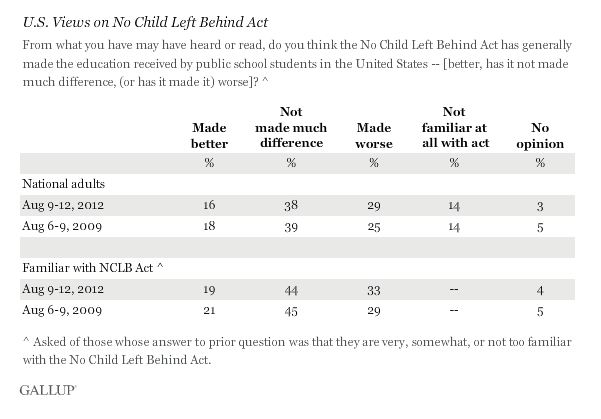
Wagner (2008) continues to argue his point in chapters 3 and 4 that students in America are not being prepared to be global citizens through our education system. There is too much emphasis placed on content and testing and not enough placed on critical thinking, problem solving and collaborating. Wagner provides examples of state tests; they are content-driven and require very little critical thinking. Wagner proposes a wonderful idea about how to change testing. He suggests we “develop higher-quality open-response, competency-based tests that can be given less frequently to a representative sample of the student population” (Wagner, 2008, p.118). This would take the pressure off the individual student or teacher and put it onto the institution as a whole. This is a fantastic idea, but I don’t see it working in practice. Education has been data driven since 2001 with NCLB and I don’t know how willing taxpayers will be to ease off testing. Wagner goes on to explain that better tests have not been implemented because “there has not yet been a public demand for better assessments” (2008, p.119). This is where I think the problem lies. I don’t think the issue is with teachers, or administrators, or students. I think the problem lies with how people view education. We weren’t doing well enough compared to our international counterparts, so we adopted No Child Left Behind. This was not a close vote either. The House of Representatives passed the law with 384 “ayes” to 45 “noes” (“No Child Left Behind Act”, 2001) while the U.S. Senate passed the law with 91 to 8 (“U.S. Senate Roll Call Votes,” 2001). A recent survey conducted by a gallup poll shows that many Americans either don’t think NCLB (38%) has made a difference or has made education worse (29%) (Saad, 2012). Teachers are teaching to the test because they are being told that passing state tests is crucial to improving student achievement. However, many Americans don’t think this is improving education. Is that the teacher’s fault? We are doing what we are asked to do, not what we feel is the best for students.
My favorite quote so far in the entire book is Wagner’s suggestions on how to improve schools.
What we don’t yet know is whether American taxpayers and our government care enough about the future
to pay educators a more professional wage and to provide them with the working conditions they need to
succeed: smaller classes, teachers organized into teams with shared responsibility for groups of students,
more effective coaching for continuous improvement, better and more frequent local assessments of
students’ progress, and more time to work and learn with colleagues” (Wagner, 2008, p.165).
Wow. This one paragraph sums up everything that I would like to achieve as an educational leader. I’m not entirely sure that all of these goals are possible, but they are all valuable goals to work towards. As a teacher I already have inspired change at my current school site to achieve some of these goals. Currently our fourth and fifth grade are departmentalizing. Each teacher focuses on one subject and we rotate our classes amongst the teachers. This allows teachers more time to enhance their lessons and provide better instruction to students instead of being spread thin amongst all the subjects. My colleague and I were the first two to do this two years ago, then I talked fourth grade into doing it. This upcoming year our school is growing so we will be switching between three teachers instead of just two in both fourth and fifth grade. Due to this switching, teachers work collaboratively with colleagues all the time. This has also been a change I have seen happen in the two years I have been at my current school site. I talk to all my colleagues about everything I am doing. I’ve always been this way and I know it brings teachers together. There is often a lot of competition between teachers, but sharing ideas and being open to new ideas puts an end to all this. At my site the entire fourth and fifth grade team meet every week and discuss different ideas about students, curriculum, technology, and more. This has made our team much more effective because we know we can rely on each other to support us when needed. This is what educational leaders need to do in order to improve student achievement. If teachers have a support system, they will be more effective, which will, in turn, enhance student achievement.
Resources
"No Child Left Behind Act." Final Result for Roll Call 145. Office of the Clerk of the U.S. House
of Representatives, 2001. Web. 17 July 2015.
<http://clerk.house.gov/evs/2001/roll145.xml>.
Saad, Lydia. "No Child Left Behind Rated More Negatively Than Positively." Gallup.com, 2012.
Web. 17 July 2015.
<http://www.gallup.com/poll/156800/no-child-left-behind-rated-negatively-positively.aspx>.
"U.S. Senate Roll Call Votes 107th Congress - 1st Session." U.S. Senate: Roll Call Vote. U.S.
Senate, 2001. Web. 17 July 2015.
<http://www.senate.gov/legislative/LIS/roll_call_lists/roll_call_vote_cfm.cfm?
congress=107&session=1&vote=00192>.
Wagner, T. (2008). The global achievement gap. Why even our best schools don't teach the
new survival skills our children need - and what we can do about it. New York, New
York: Basic Books.

 RSS Feed
RSS Feed